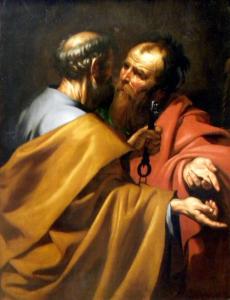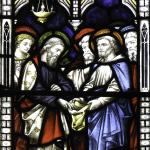— and Biblical Disproof #185 of sola Scriptura —
Protestants tells us that there is no such thing as an infallible Church, and that only Scripture is the infallible source and standard and norm for the Christian faith and doctrine. We can never put our trust in Church or tradition as a guide to determine truth or falsity of propositions or rightness or wrongness of actions, since they are not guaranteed infallibility. So Protestants tell us, and this is their notion of sola Scriptura, which they have arbitrarily and illogically made their entire rule of faith.
Showing that the Bible is infallible, or inspired, or inerrant, or revelation proves nothing whatsoever, as to the rule of faith or sola Scriptura. No one disagrees that it is all of those things.
As always, the necessary Protestant task is to prove from Scripture that Scripture is the sole infallible standard, source, and norm for Christian doctrine and theology and that nothing else (tradition, Church, apostolic succession, bishops, councils) is ever that. The latter is just as much part of sola Scriptura as the former strict definition. It’s a claim of exclusivity; therefore, it is the task of the sola Scriptura adherent to prove that nothing besides Scripture is ever the infallible standard, source, and norm for Christian doctrine and theology.
Protestants can’t do that because it’s impossible to do, and I’ve never observed an Protestant — in my thirty-one years of Catholic apologetics — ever do it. What Protestants almost always do when faced with this simple challenge is hem and haw, major on the minors, beat around the bush, engage in obscurantism and obfuscation, change the topic: all the while ignoring the elephant in the room.
I don’t mean to belabor the point, or to harangue our separated brethren (who have many fine qualities and whom I respect and admire), but as a simple intellectual duty and matter of theology and apologetics, Protestants need to get honest with themselves and either prove sola Scriptura from Scripture once and for all, or else concede that it in fact is not in the Bible at all and that it has been a sort of mass delusion these past 500 years.
This current article will be yet another argument for the infallibility of the Church. Recently, I contended that the choosing of Matthias as an apostle was an exercise in Church infallibility: the very thing that Protestants tell us is untrue. Perhaps the best argument for the infallibility of the Church is the Jerusalem Council, which I’ve written about many times. The other “killer argument” is concerning the meaning of 1 Timothy 3:15, where the Church is described as the pillar and bulwark (or foundation) of the truth. I’ve explained that argument in at least three lengthy articles as well.
So that is three strong biblical arguments establishing a notion (an infallible Church) that Protestants deny as an ongoing reality. They can’t prove sola Scriptura from Scripture, and they can’t disprove these biblical arguments that are fatal to it. It’s quite a logical and theological bind. Small wonder, then, that it is quite the rarity to see a Protestant actually seriously respond to Catholic critics of sola Scriptura, who make biblical arguments.
St. Paul, as every Bible student knows, originally was a violent opponent of the new Christian Church and of Christians (Acts 7:54-60; 8:1-3; 9:1-2, 13-14, 21, 26; 22:4-5, 18-20; Gal 1:13, 23), until he experienced a dramatic encounter with Jesus and was converted to Christianity on the spot (Acts 9:3-31; 22:6-16).
Acts 9:26-29 (RSV) And when he [Paul] had come to Jerusalem he attempted to join the disciples; and they were all afraid of him, for they did not believe that he was a disciple. [27] But Barnabas took him, and brought him to the apostles, and declared to them how on the road he had seen the Lord, who spoke to him, and how at Damascus he had preached boldly in the name of Jesus. [28] So he went in and out among them at Jerusalem, [29] preaching boldly in the name of the Lord. . . .
Benson Commentary It does not appear that on this occasion any thing was said, either by Barnabas or by Saul, concerning Christ’s making Saul an apostle at the time he converted him, or concerning his sending him to preach to the idolatrous Gentiles, as is related by the apostle himself, Acts 26:16-18. These things were not mentioned in Jerusalem till Paul went up to the council, fourteen years after his conversion, Galatians 2:2; Galatians 2:7-9.
Galatians 1:15-19 But when he who had set me apart before I was born, and had called me through his grace, [16] was pleased to reveal his Son to me, in order that I might preach him among the Gentiles, I did not confer with flesh and blood, [17] nor did I go up to Jerusalem to those who were apostles before me, but I went away into Arabia; and again I returned to Damascus. [18] Then after three years I went up to Jerusalem to visit Cephas, and remained with him fifteen days. [19] But I saw none of the other apostles except James the Lord’s brother.
Galatians 2:9 and when they perceived the grace that was given to me, James and Cephas and John, who were reputed to be pillars, gave to me and Barnabas the right hand of fellowship, that we should go to the Gentiles and they to the circumcised;
Benson Commentary [B]y giving them the right hands of fellowship, the three apostles acknowledged them to be true ministers of the gospel, each according to the nature of his particular commission. Paul they acknowledged to be an apostle of equal authority with themselves; and Barnabas they acknowledged to be a minister sent forth by the Holy Ghost to preach the gospel to the Gentiles. This distinction it is necessary to make, because it doth not appear that Barnabas was an apostle, in the proper sense of the word.
Meyer’s NT Commentary [I]t is evident that the recognition . . . really amounted to an acknowledgment of apostolic equality . . .
John Gill’s Exposition of the Bible [A]s a token of a covenant or agreement between them; they took them, as it were, into partnership with them, admitted them as apostles into their society, and gave their full consent . . .
This is the argument. It’s very simple and elegant. After Paul’s conversion, he is accepted by Peter (Cephas), James, and John as a fellow apostle (Gal 2:9). This is the infallible act of the Church and cannot not be. If St. Paul had not been acknowledged by the Church as an apostle, then he could and would have never been the greatest evangelist of all time. He would not have been the author of approximately 24% of the New Testament, and its primary systematic theologian and thinker (as opposed to the — mostly — storytelling of the Gospels, Acts, and Revelation).
St. Paul had to be recognized as an apostle who had witnessed Jesus Christ in an encounter (albeit subsequent to His resurrection and ascension), in order for his witness to be authentic. Protestants readily agree that Paul was an apostle, as he claimed to be many times. When Peter, James, and John acknowledged this by accepting Paul as an equal (Gal 2:9) it was clearly an infallible pronouncement or corporate understanding, coming from the Church as it was at that time, led by Peter. If it is denied that this is infallible, then whenever Paul appealed to his status as an apostle, he would be lying and deceiving.
Now, Protestants may say that Paul was already an apostle and did not necessarily need human approval, even from those in the leadership of the Church. Well, yes and no. That’s not how New Testament Christianity works. It’s a unified team. There are no loose cannons or “lone rangers.” The need still exists for an authoritative pronouncement, so that all and sundry are aware of the truth.
Likewise, as a fifth exercise of Church infallibility, in a time long after the New Testament had been written (late fourth century), the Catholic Church proclaimed which books were part of the New Testament canon (a thing the Bible itself never does). Does it follow that the canon wasn’t what it was before it was proclaimed, or that the Church created the inspired Bible when it detailed the canon? No (as I have written about). The canon already was what it was: inspired revelation. The Catholic Church taught that in both Vatican I and Vatican II. But it was good and very practical to have the authoritative list, so human beings could agree.
In the same manner, Paul was already an apostle before he was extended the “right hand of fellowship” as a fellow apostle in the Church. Yet it was good and necessary for the Church (run on the human level by human beings) to make this clear. The Church could not have possibly been wrong in arriving at this decision. Therefore it is an instance of Church infallibility and a disproof of sola Scriptura, to add to the long list of same.
***
Practical Matters: Perhaps some of my 3,900+ free online articles (the most comprehensive “one-stop” Catholic apologetics site) or fifty books have helped you (by God’s grace) to decide to become Catholic or to return to the Church, or better understand some doctrines and why we believe them.
Or you may believe my work is worthy to support for the purpose of apologetics and evangelism in general. If so, please seriously consider a much-needed financial contribution. I’m always in need of more funds: especially monthly support. “The laborer is worthy of his wages” (1 Tim 5:18, NKJV). 1 December 2021 was my 20th anniversary as a full-time Catholic apologist, and February 2022 marked the 25th anniversary of my blog.
PayPal donations are the easiest: just send to my email address: [email protected]. You’ll see the term “Catholic Used Book Service”, which is my old side-business. To learn about the different methods of contributing, including 100% tax deduction, etc., see my page: About Catholic Apologist Dave Armstrong / Donation Information. Thanks a million from the bottom of my heart!
***
Photo credit: Jorge Elías (7-27-13). Peter and Paul (c. 1612), by Jusepe de Ribera (1591-1652) [Flickr / CC BY 2.0 license]
***
Summary: When Peter, James, and John agreed in confirming Paul’s apostleship (Gal 2:9), this was obviously an infallible act and thus also one of many disproofs of sola Scriptura.

















